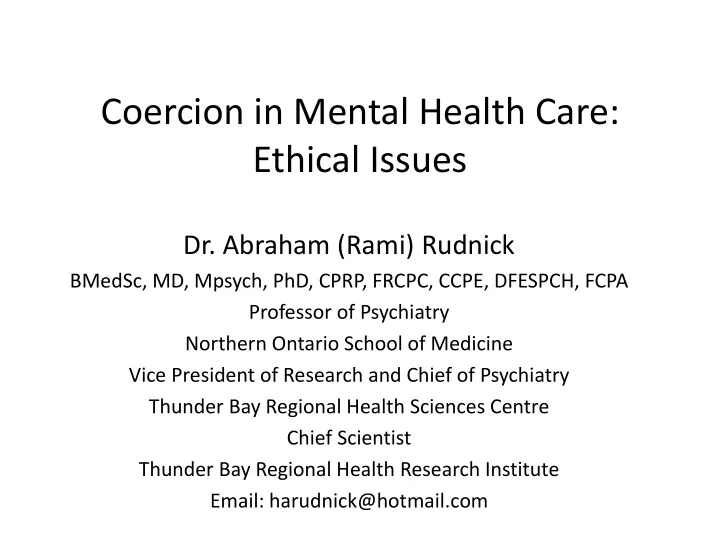

Coercion in Mental Health Care: Ethical Issues Dr. Abraham (Rami) Rudnick BMedSc, MD, Mpsych, PhD, CPRP, FRCPC, CCPE, DFESPCH, FCPA Professor of Psychiatry Northern Ontario School of Medicine Vice President of Research and Chief of Psychiatry Thunder Bay Regional Health Sciences Centre Chief Scientist Thunder Bay Regional Health Research Institute Email: harudnick@hotmail.com
Disclosures (no actual conflict of interests) • Industry funding, e.g., Janssen, Lilly, Astra Zeneca. • Public funding, e.g., CIHR, SSHRC, UWO, VIHA, McMaster University.
Summary • Background: Coercion in mental health care is commonly used across settings and jurisdictions but is controversial theoretically and empirically. • Objective: This presentation will address ethical issues of coercion in mental health care. • Methods: Ethical argumentation will be discussed and related clinical situations will be described. • Results and Conclusions: Least coercion in mental health care across settings and jurisdictions is the most sound option and should be advocated for.
Background • Coercion in mental health care is commonly used across settings and jurisdictions, e.g., in involuntary hospitalization (civil and forensic), in treatment (inpatient and outpatient), and in different provinces (Pallaveshi & Rudnick 2017). • Such coercion is controversial theoretically and empirically, e.g., re subjective experience and objective effectiveness of community treatment orders (Corring et al 2017; Kisley et al 2017).
Objective • This presentation will address ethical issues of coercion in mental health care.
Methods • Ethical argumentation will be discussed.* • Related clinical situations will be described. * Principlism will be assumed in this discussion.
Results • Coercion is an attempt to ‐ directly or indirectly – change a disagreeing person’s circumstances, behavior and/or experience, e.g., re hospital stay or adherence to treatment. • Coercion of capable* patients is acceptable ethically iff there is considerable risk to others due to their (physical or mental) health condition. • Coercion of incapable patients is acceptable ethically if there is considerable risk to others as above and/or if it is in their own best interests (based on their past capable preferences or – if unknown ‐ other considerations). * Capacity addresses various abilities and is assessed situationally.
Results ‐ continued • Some but not all people with mental illness (including serious mental illness) are incapable. Those that are capable should not be coerced. Those that are incapable should be coerced if(f?) there is considerable risk to themselves due to their mental illness. • Some mental health care cannot by definition use coercion, e.g., psychiatric rehabilitation (Rudnick 2007). • Coercion in mental health care may risk a slippery slope, e.g., is housing in scope for CTOs (Dawson et al 2015)?!
Related Clinical Situations • Involuntary inpatient admission of a depressed but capable patient in BC. • Forced ER feeding of an anorexia nervosa (incapable?) patient in Ontario.
Conclusions • Least coercion in mental health care across settings and jurisdictions should be advocated for. • More theoretical and empirical research on coercion in mental health care is needed.
References Corring D, O’Reilly R, Sommerdyck C. A systematic review of the views and • experiences of subjects of community treatment orders. International Journal of Law and Psychiatry 2017; March 18. pii: SO160 ‐ 2527(16)30158 ‐ 3. Dawon J, O’Reilly R. Residence conditions on community treatment • orders. Canadian Journal of Psychiaty 2015; Noember; 60(11)523 ‐ 7. Kisley SR, Campbell LA, O’Reilly R. Compulsory community and involuntary • outpatient treatment for people with severe mental disorders. Cochrane Database Systematic Reviews 2017; March 17;3:CD004408. Pallaveshi L, Rudnick A . Mental health acts in relation to ambulatory • patients in Canada: a legal comparison and ethical analysis of Ontario's Community Treatment Order and British Columbia's Extended Leave. Journal of Ethics in Mental Health 2017; 10(1): 1 ‐ 21. Rudnick A. Coercion and psychiatric rehabilitation: a conceptual and • ethical analysis. BMC Psychiatry 2007; 7(Suppl 1): S22.
Recommend
More recommend